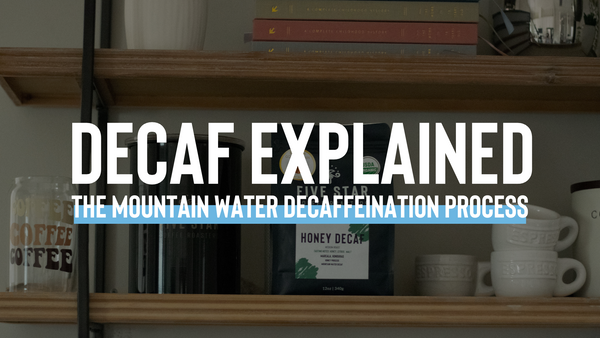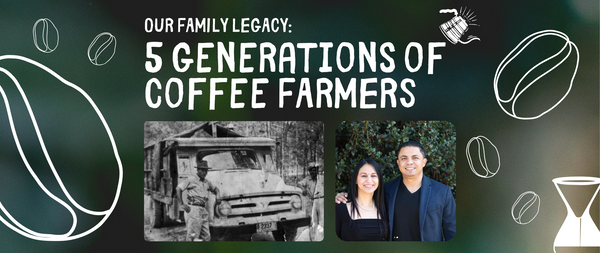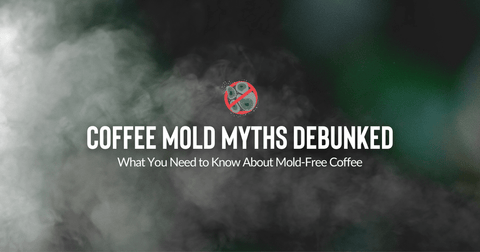
Decaf Explained: Mountain Water Decaffeination Process
📖 Table of Contents:
- Introduction: Decaf Coffee Explained
- Types of Coffee Decaffeination
- The Mountain Water Decaffeination Method: A Natural Approach
- How Mountain Water Decaf Works: Step-by-Step Process
- Quality and Flavor: Preserving the Taste of Specialty Coffee
- Sustainability and Environmental Impact: Eco-Friendly Decaf
- Health Benefits: Enjoying Coffee Without the Caffeine
- Brewing Tips for Mountain Water Decaf: Maximizing Flavor
- MW Decaf: The Roaster's Perspective
- Conclusion: Elevating Your Decaf Experience
| Key Takeaways | Details |
|---|---|
| Mountain Water Decaffeination | The Mountain Water Decaffeination process is an organic, natural and chemical-free method that preserves the flavor and aroma of coffee beans while removing caffeine. |
| Types of Decaffeination | There are various methods for decaffeinating coffee, including solvent-based and water-based processes. Mountain Water Decaf is one of the water-based methods known for its eco-friendly approach. |
| Sustainability and Health Benefits | Eco-friendly decaf processes, like Mountain Water Decaf, promote sustainability and offer health benefits by retaining antioxidants and reducing caffeine intake. |
| Brewing Tips for Optimal Flavor | Maximizing the flavor of Mountain Water Decaf involves using freshly roasted beans, grinding just before brewing, using high-quality water, and storing beans properly. |
| Roasting Challenges and Considerations | Roasting decaffeinated coffee beans requires careful attention to density, moisture content, and flavor profile adjustments to achieve desired results. |
| Elevating the Decaf Experience | The goal of Mountain Water Decaf and other high-quality decaf options is to exceed expectations and offer a distinguished decaf coffee experience that rivals its caffeinated counterparts. |
| Further Resources | For those interested in learning more about decaf coffee, James Hoffman's "Decaf Explained" video (below) is recommended as an educational resource. |
Introduction: Decaf Coffee Explained
Welcome to Decaf Explained, a series where we shed light on different process of removing caffeine from coffee. This article is focuses on the Mountain Water Decaffeination process and its benefits for coffee lovers seeking a caffeine-free alternative without the loss of flavor.
Types of Coffee Decaffeination
There are several methods used for decaffeinating coffee beans, each with its own process and characteristics. Some common methods include solvent-based processes like the traditional solvent method and the more modern supercritical CO2 method. These methods use either chemical solvents or carbon dioxide to extract caffeine from the beans.
On the other hand, there are water-based processes like Swiss Water Process and Mountain Water Process, which use water to decaffeinate the beans without the use of chemicals. Additionally, there's the ethyl acetate method, which uses a natural solvent derived from fruits. Each method has its advantages and may result in slightly different flavor profiles in the decaffeinated coffee.
The Mountain Water Decaffeination Method: A Natural Approach
Before diving into the step-by-step process of Mountain Water Decaf, it's important to understand the significance of this innovative decaffeination method. Mountain Water Decaf is renowned for its natural and chemical-free approach to removing caffeine from coffee beans.
Developed by Descamex in Vera Cruz, Mexico, this patented process harnesses the purity of mountain glacier water to gently extract caffeine while preserving the rich flavors and aromas of the coffee beans. Unlike traditional solvent-based methods, Mountain Water Decaf offers a cleaner and more environmentally friendly alternative, making it a popular choice among coffee aficionados seeking a high-quality decaffeinated option.
How Mountain Water Decaf Works: Step-by-Step Process
The Mountain Water Decaffeination Process:- Process: Green (unroasted) coffee beans are soaked in pure water from mountain glaciers, allowing the caffeine and coffee solids to dissolve.
- Filtering: Water is passed through activated charcoal filters to remove caffeine while retaining the flavor compounds.
- Reuse of Water: Caffeine-free water is used to decaffeinate a new batch of beans, similar to the Swiss Water Process.
- Re-Drying and Polishing: The beans are then gentle dried in cylindrical and vertical coffee dryers and polished to clean and remove dust particles before being repacked into burlap bags.
You can find a rudimentary visualization of this process here.
Quality and Flavor: Preserving the Taste of Specialty Coffee
The decaffeination process and decaffeinated coffee hav made several strides in recent years. Previously being known as lacking flavor and body, innovative decaffeinated coffees are now building a reputation as being able to hold up to their caffeinated counterparts.
Experimentation has been a key element to producing higher quality decaffeinated beans. We experienced this first hand when we decided during the pandemic to send a batch of our honey process beans from our farm in Marcala to Vera Cruz for decaffeination. What resulted was our Organic Honey Decaf which won a gold medal at the Golden Bean North America roasting competition in 2022.
Honey process refers to the process in which the coffee cherry was removed from the coffee bean and the state in which it was dried at origin in Honduras before being sent to Descamex for decaffeination.
Sustainability and Environmental Impact: Eco-Friendly Decaf
Eco-friendly decaffeination processes, such as Mountain Water Decaf, play a vital role in promoting sustainability and environmental stewardship within the coffee industry. Traditional decaffeination methods often rely on chemical solvents that can pose risks to both human health and the environment.
In contrast, eco-friendly decafs prioritize natural and environmentally sustainable approaches, utilizing methods like water extraction or organic solvents derived from natural sources. By opting for eco-friendly decaffeinated coffee, consumers can enjoy their favorite brew without compromising on taste or quality while also supporting practices that minimize harm to ecosystems and communities.
Additionally, eco-friendly decafs help promote biodiversity by preserving the integrity of coffee-growing regions and protecting the habitats of wildlife. Overall, embracing eco-friendly decaffeination processes is a significant step towards building a more sustainable and ethically responsible coffee industry for future generations.
Health Benefits: Enjoying Coffee Without the Caffeine
Enjoying decaffeinated coffee offers a myriad of health benefits for those who love the taste of coffee but prefer to limit their caffeine intake. Decaf coffee provides all the rich flavors and aromas of regular coffee without the stimulating effects of caffeine, making it an excellent choice for individuals sensitive to caffeine or those looking to reduce their overall caffeine consumption.
Decaf coffee is less likely to disrupt sleep patterns or cause jitters, making it a fantastic option for enjoying a warm cup of coffee later in the day or evening. Furthermore, decaffeinated coffee retains many of the antioxidants and beneficial compounds found in regular coffee, which have been linked to various health benefits, including reduced risk of chronic diseases such as heart disease, type 2 diabetes, and certain cancers.
Incorporating decaf coffee into your daily routine can be a delicious and health-conscious choice for coffee lovers seeking a caffeine-free alternative.
☕ Brewing Tips for Mountain Water Decaf: Maximizing Flavor
Brewing decaffeinated coffee well requires attention to detail and a few essential tips to ensure you're receiving the optimal flavor and extraction. Depending on your preferences you may need to dial in your dosage to your preference.
If we were to give four key areas to improve your brewing process we'd recommend:
- Use freshly roasted beans between 2 days to three weeks off roast
- Grinding beans directly before brewing for optimal flavor. Pay attention to the grind size of the coffee beans and adjust accordingly to achieve the desired strength and extraction.
- Brew with high quality water (avoid tap).
- Store your decaf coffee beans in an airtight container in a cool, dark place to preserve freshness and flavor.
Mountain Water Decaf: The Roaster's Perspective
From a roasting perspective, decaffeinated coffee beans can present a challenge since they require careful attention to details and nuances in the bean over time
One of the primary challenges lies in the inherent differences between decaffeinated and regular coffee beans, particularly in their density and moisture content. Decaf beans tend to be denser and more prone to heat retention, making them trickier to roast evenly and consistently.
The decaffeination process can alter the flavor profile of the beans, requiring us to adjust our roasting parameters accordingly to highlight the desired characteristics while minimizing any potential off-flavors.
The absence of caffeine affects our roasting process, as caffeine plays a role in the Maillard reaction, which contributes to the development of flavor compounds during roasting. We have to more carefully monitor the roasting curve and make adjustments as needed to ensure that our decaffeinated coffee beans are roasted as intended, resulting in a delicious and well-balanced cup.
Conclusion: Elevating Your Decaf Experience
We hope you've learned a little more about the journey behind our organic mountain water process decaffeinated coffee beans and our efforts to create a distinguished decaf coffee without compromising the rich flavors and aromas of a good quality coffee.
Ultimately, we selected the Mountain Water Decaf process for our signature Honduras Honey Decaf because it not only offers a superior decaffeinated coffee experience but also aligns with our values of sustainability and quality that we hope will continue to make waves in the coffee industry but most importantly, exceed your expectations of what a decaf coffee can be. 🔥
🧠 Interested in learning more about decaf coffee? We recommend James Hoffman's Decaf Explained video.

🫂 WHO ARE WE?
Five Star Coffee Roasters exists to disrupt the coffee supply-chain across countries and cultures by supplying relationship-based coffee. We empower coffee drinkers, coffee farmers, and their communities.
We do this by expertly roasting and directly sourcing coffee from our family farms in Honduras as well as partnering with other coffee producing families around the world. We believe good coffee starts at origin and hope you'll notice the Five Star difference.


